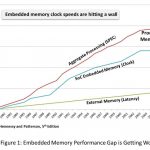TSMC has been offering foundry services since 1987, and their first 3nm node was called N3 and debuted in 2022; now they have an enhanced 3nm node dubbed N3E that has launched. Every new node then requires IP that is carefully designed, characterized and validated in silicon to ensure that the IP specifications are being met and … Read More
Tag: embedded memory ip
Synopsys – Turbocharging the TCAM Portfolio with eSilicon
About 90 days ago, Synopsys completed the acquisition of certain IP assets from eSilicon. The remaining entirety of eSilicon was acquired by Inphi Corporation. I was the VP of marketing at eSilicon during that acquisition so it’s very interesting to me to find out how things are going with those certain IP assets. I got an opportunity… Read More
The Business Case for Algorithmic Memories
Economic considerations are a primary driver in determining which technology solutions will be selected, and how they will be implemented in a company’s design environment. In the process of developing Memoir’s Algorithmic Memory technology and our Renaissance product line, we have held fast to two basic premises: Our technology… Read More
Mind the Gap — Overcoming the processor-memory performance gap to unlock SoC performance
Remember the processor-memory gap— a situation where the processor is forced to stall while waiting for a memory operation to complete? This was largely a result of the high latency required for off chip memory accesses. Haven’t we solved that problem now with SoCs? SoCs are typically architected with their processors … Read More





